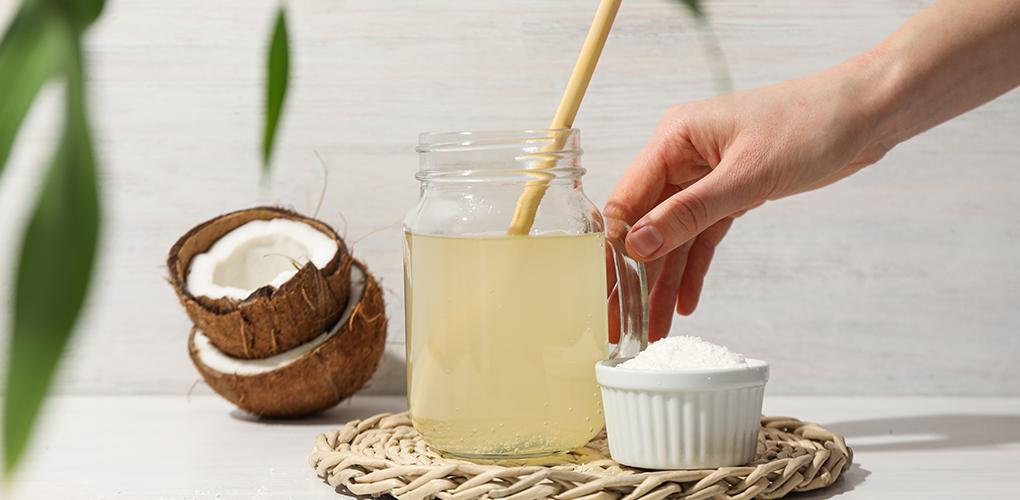Oil Pulling
Oil pulling is a traditional remedy used to keep the mouth healthy and clean by eliminating dirt and microorganisms. Swishing oil about the mouth like mouthwash is known as oil pulling. Reducing the number of dangerous bacteria in the mouth is the main benefit of oil pulling.
Oil pulling is beneficial for improving gum health and prevents bad breath and tooth decay. However, there are some misconceptions about oil pulling for cavities and teeth whitening. There is no evidence available that shows that oil pulling can reverse tooth decay. Moreover, no scientific evidence supports that oil pulling can whiten your teeth. Oil pulling can be used to remove bacteria from teeth' surface but cannot lighten the shade of teeth.
Benefits of Oil Pulling
- Reduce harmful bacteria from the mouth
- Lower the chances of bad breath
- Prevents plaque accumulation
- Reduce the risk of cavities
- Improve gum health
How to Oil Pull?
Oil pulling can be done with any oil, but most people prefer extra virgin coconut oil because of its taste. Take one tablespoon of coconut oil in your mouth and swish around in the oral cavity. Start doing oil pulling for 5 to 7 minutes then increase time slowly to 15 to 20 minutes for optimal care.
Oils Suitable for Oil Pulling
Any oil can be used for oil pulling like coconut, sesame, sunflower, almond, or olive oil. Some people prefer a few drops of essential oils like tea tree mixed with carrier oils. Coconut oil is the most preferred choice because of its fragrance and taste.
Oil Pulling vs. Traditional Oral Care
No matter how effective oil pulling is for oral health, it cannot replace traditional oral care. Many dentists do not recommend oil pulling as a substitute for regular dental checkups and conventional at-home oral hygiene practices like brushing and flossing. Brushing twice a day and flossing once daily is necessary for a healthy mouth.
Impact on Gums
Gingivitis is the inflammation of gums caused by plaque and bacteria. Gingivitis makes gums fragile and weak, so they bleed easily. Oil pulling for gums can improve gum health by removing bacteria and preventing plaque buildup.
Effect on Teeth
The main reason for tooth decay is bad oral hygiene and bacteria. Oil pulling for teeth cleans the mouth by eliminating bacteria and preventing tooth decay. Keep in mind that oil pulling cannot replace brushing and flossing in preventing tooth decay.
Effectiveness in Removing Plaque
Oil pulling is effective in removing plaque and bacteria. It improves gum health and prevents plaque buildup. Remember that oil pulling cannot remove the hard tartar from tooth surfaces but can prevent new tartar buildup.
Scientific Research on Oil Pulling
There is not much evidence available to support oil pulling. One study was carried out in Italy back in 2020 with just 20 participants having complaints of gingivitis and bleeding gums. This study proved that oil pulling is effective in the management of bleeding gums. However, the authors suggested that more research is needed to support the results.
A systematic review was conducted in 2020, based on four research articles available on scientific electronic databases. These articles were selected to measure the effects of coconut oil on oral health and dental hygiene. This systematic review concluded that there is no precise finding of oil pulling on oral health and dental hygiene due to a lack of evidence.
American Dental Association (ADA) does not support oil pulling due to no proven scientific research. That is why many dentists do not recommend oil pulling for oral care.
Precautions and Side Effects of Oil Pulling
Regardless of the positive effects, oil pulling does have some negative side effects. Oil pulling can cause muscular stiffness, dry mouth, loss of taste, and loss of sensation. Oil pulling is also not safe for people who are allergic to coconut or any essential/carrier oil.
Additionally, people are advised to spit in the garbage or on a piece of tissue and discard it in the bin. Oil might get clogged in pipelines causing trouble.
Integrating Oil Pulling into Oral Care Routine
Most dentists do not recommend oil pulling as part of dental hygiene practice due to lack of evidence. However, some people perform oil pulling daily, but some prefer a less frequent approach. It depends on a person’s own preferences whether to integrate oil pulling into an oral care routine or not.

